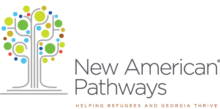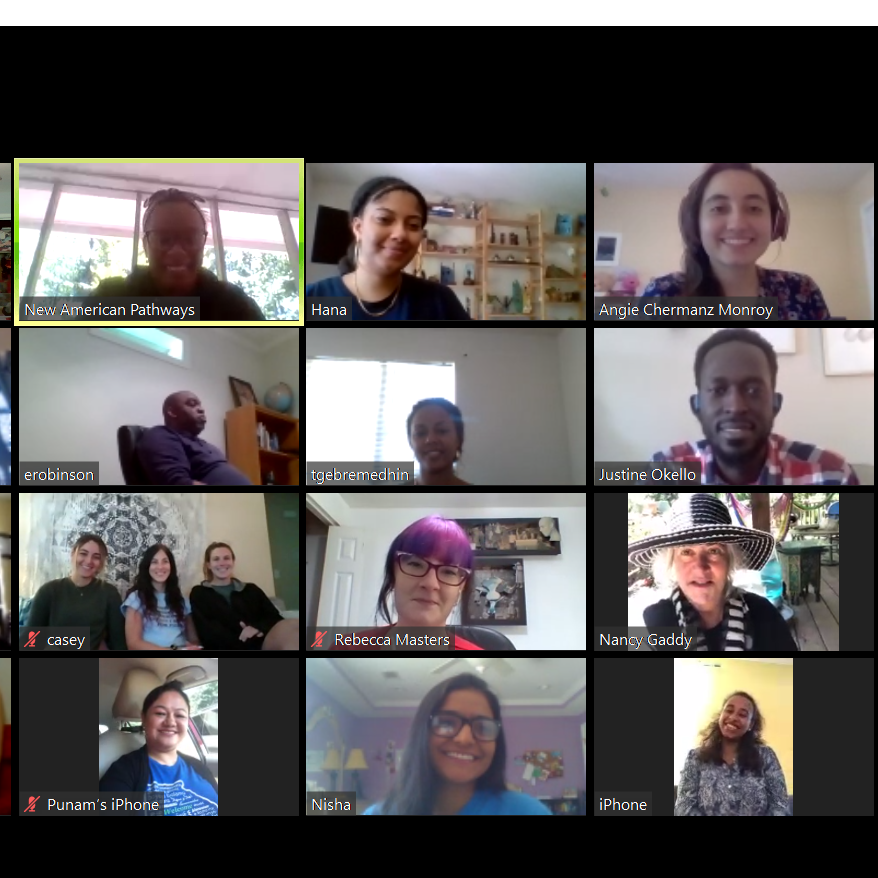Our theory of change, the New Americans Pathway is designed to help refugees and immigrants walk down a path to success and service. Each program at New American Pathways contributes to the pathway, and our work doesn’t stop or slow down during a global health crisis like COVID-19. While this situation was unexpected and has been challenging on many different levels, we have adapted to this shift throughout our programs and want to answer some questions we’ve gotten from supporters.
How has the refugee community been affected? The refugee community in Atlanta has been affected in similar ways as other groups in our city but are also experiencing unique challenges. There have been reported cases and hospitalizations from COVID-19, and others who are sick but have not been tested. Many refugees have lost their jobs over the past month, especially those in warehouse, restaurant, and hospitality jobs. While some refugees are eligible for stimulus funds, refugees who arrived after October 1, 2019 are not eligible. This is especially challenging since many of them were looking for their first jobs when the COVID-19 began spreading in the United States, and finding employment at this time is incredibly challenging. In addition, because of the diverse languages spoken in the refugee community, ensuring they understand the resources available to them and the ways to receive assistance has been a very significant task.
How has New American Pathways been affected? Two of our major event fundraisers have been cancelled or will be changed to accommodate social distancing, resulting in a pretty significant revenue loss. In addition, refugee arrivals have stopped, but demand for case management services has not. In fact, many of our programs have seen an increase in demand for services. We are anticipating a loss of up to $400,000 in revenue this year, and we are reaching out to our partners, donors, and friends to come alongside of us in their generosity to ensure that refugees receive the services they need during this time.
How is New American Pathways responding to this crisis? All of our programs are continuing to provide services to clients and are responding to urgent needs on an ongoing basis. We are helping refugees navigate this difficult time through case management, resource navigation, and meeting emergency needs. We are disseminating updated information in multiple languages as rapidly as possible and are making sure refugees understand the process for accessing stimulus funds, unemployment and other benefits. Through our partnership with the CRSA and other coalitions, are staying connected to the Clarkston community and offering services to people affected. We have signed on to a letter from the CRSA to the Governor’s office, asking for specific policy changes to help the refugee and immigrant community. We are committed to taking care of our staff team and ensuring they are safe and healthy, and have been doing a work from home protocol since mid-March. Each of our programs have adapted their services to respond to the needs of new Americans.

Resettlement and Resource Navigation has seen a significant increase in demand for case management services. While we are not welcoming new refugee arrivals right now, many refugees and immigrants have come to our team with questions, concerns, and needs. We’ve shifted our focus to providing intensive case management, resource navigation and emergency assistance as many refugees have already lost their jobs or experienced other crises as a result of COVID-19. Our employment team is ensuring clients who have lost their jobs understand how to apply for unemployment and other resources for which they are eligible.
The team at the Welcome Co-op compiled a compressive list of the rent policies of all apartment complexes we work with to ensure we have up to 

Family Empowerment is helping domestic violence victims navigate through this situation with emergency assistance, crisis intervention and case management. We are anticipating an increase in clients as this situation continues. Our Parents as Teachers (PAT) program staff distributed activity kits and materials to parents right before we stopped in person home visits so parents would have age appropriate activities to do with their toddlers and preschoolers. We are doing virtual home visits with PAT clients to ensure each family is doing well and has what they need during this time.
Our Forward Adult Education program staff are maintaining existing adult education activities through virtual means. Even though hiring is limited right now, we are doing virtual vocational counseling and coaching so new Americans are able to work on their vocational skills to be ready when companies begin hiring again. We are still recruiting volunteers for English at Home for virtual opportunities to help tutor refugee families. During this time of social distancing, there’s greater demand for volunteers to connect with refugee families in this way.
The team in our Education and Youth department acted quickly to shift to virtual learning and support. Staff distributed learning packets to elementary families who do not have access to a computer and School Liaisons are doing weekly check in calls with each family. Teachers have created online lessons on YouTube and are offering phone and other distance learning support to students as they need it. Refugee families do not always have access to technology to complete the online lessons day school teachers provide, so our Teachers and School Liaisons have been spending many hours working with families through technology they can access. We want to be sure that the students we serve- many of whom have experienced education disruption in the past, are able to stay on track with their education goals.
Immigration shifted appointments virtually through applications and formats that clients are comfortable with, including ‘virtual walk in’ times each week. They continue to work with clients with a variety of immigration cases and are developing even more tools to serve the community during this time. They’ve been praised by one of our coalition partners for their flexibility and creativity in maintaining services.

The work in our Civic Engagement department has not slowed down during this time, and in many ways has increased as we continue to ramp up our Census and voter registration outreach initiatives. The team is making multi lingual outreach videos, using text-based applications to do outreach, and is continuing virtual organizing and coalition work to continue the momentum we had prior to COVID-19. There are several major dates for elections and the census that have been changed, so we are disseminating linguistically appropriate material on a regular basis and are providing updates as needed so new Americans understand their rights and opportunities to engage in the civic process.

